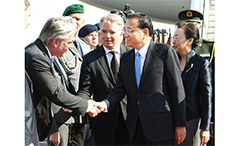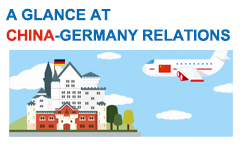China, Germany look to strengthen high-tech cooperation during Premier Li’s Berlin visit
2018-07-09
cgtn.com
When Premier Li Keqiang visits Berlin this week, one of the main focuses of his meetings with German Chancellor Angela Merkel will be continuing to develop business and technology ties between the two nations.
Chinese enterprise investments in Germany have ramped up in recent years, with more and more Chinese companies setting up research and development centers in Germany.
An example of this trend is the Chinese company Hangsheng. The Shenzhen-based firm, which specializes in electronic products for automobiles, expanded its operations to Berlin five years ago. Its German office has now grown to 25 employees.
The focus of Hangsheng’s German operation is research and development for the connected technology which will be used in the automobiles of the future. Its main customers are European automakers looking for new technology and suppliers to enhance their business, which is worth over half a trillion dollars annually.
“We have to have the local Europe footprint, for our customers here in Europe,” said Leon Xia, Hangsheng Germany’s Deputy General Manager.
What Hangsheng is doing fits into the Made in China 2025 strategy, a push by the Chinese government for more high-tech manufacturing. It was inspired by Berlin’s own similar strategy, called Industrie 4.0, and Germany has become a key location for Chinese companies.
“It’s also a good place because a lot of automotive technology you can find here,” said Ralph Meyfarth, Hangsheng Germany’s General Manager. “We would cooperate with other companies on new technologies, and provide these technologies back also to China.”
But the relationship between China and Germany hasn’t been completely smooth in recent years. Berlin has long sought more reciprocity for German companies who have complained about the regulations they face doing business in China.
Beijing has also taken issue with the increased scrutiny of Chinese buyers investing in or purchasing German firms, which hit record levels last year. The Premier addressed those issues during Merkel’s most recent visit to China in May, saying that “both China and Germany should strengthen and carry out mutual investment in a more open and inclusive attitude.”
While some of those concerns remain unresolved, both China and Germany have repeatedly expressed commitment to global free trade, and opposition to the recent protectionist measures in the United States. At the moment it appears that both countries see a clear benefit in working together.



